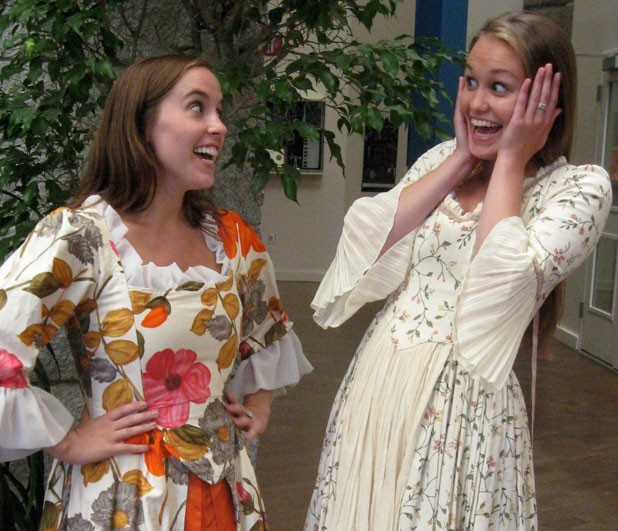
Mozart wrote his delightful opera The Marriage of Figaro in Italian, but this weekend audiences will have the chance to hear it sung in German. If that seems like an esoteric offering, it is — at least in this country. In Germany, a country with some 80 active opera houses — the highest number per capita of any nation — Figaro is performed in German “quite a bit,” says Bettina Matthias, director of German for Singers, a program within Middlebury College’s summer German-language immersion school that’s producing the opera.
Because of Germany’s density of employment opportunities, many American opera singers choose to launch their careers there. German for Singers is the only program in the U.S. dedicated to preparing them for such a route. During seven intense weeks, it trains vocalists not only to sing in well-pronounced German but to understand what they’re singing.
Matthias, who is also Midd’s German department chair and a pianist, will be directing the opera — her first — with help from Stephan Boving, of Komische Oper Berlin, and music director Stefan Rütter, from Cologne’s music university. The program’s 13 participants, aged 20 to 34, have all been precast, some two to a part; the performance has no chorus and will last only two hours, with recitatives being spoken instead of sung.
At the beginning of the fifth week, Matthias cheerfully reports of the participants, “It’s fabulous how they’re doing. They’re always in a good mood, which is really important in a program like this.” The daily schedule includes four hours of grammar in the morning followed by afternoon and evening rehearsals. And, though a few of the singers are more experienced — one covers at the Metropolitan Opera in New York City; another sings around the country — four entered the program knowing no German at all.
Soprano Angela Gribble, 27, is among them. Breaking the program’s required pledge not to speak in English, the Kansas City, Mo., resident admits with a laugh, “The first week of class, I had no idea what the teacher was talking about. I was thinking, What am I doing here? Today, I didn’t understand every word, but I understood to the point where I could contribute to the conversation.”
That makes a difference in performance, she says: “It’s so much easier to express what’s in the music if you know what you’re singing.” All singers sit down with a dictionary and work out word-for-word translations of a libretto or text when they don’t know its language, says Gribble. She did so with a Strauss song five years ago, but when she sang the same song at the Midd program’s recent lieder concert, she could grasp “the poetry in it.”
Gribble will sing Susanna in the Figaro production, a role she performed last year in Italian at the University of Missouri in Kansas City, where she is earning an advanced degree. Asked which version she prefers, she replies, “I like it in both [languages]. Some parts I like better in German; some are better in Italian.” She deems the German translation of Susanna’s “Deh vieni” aria in the fourth act “kind of cheesy.” But, in another spot, the tongue-twisting consonants of a single line “help express Susanna’s panic” when her page is discovered hiding in her closet.
“Italian is in some ways easier, because it’s so much about vowels,” Gribble says, “but German has so many consonants that can be so expressive.”
Gribble and her fellow singers will learn as much from the program about singing in Germany as about singing in German. Rütter, who works for the German government agency that matches conservatory graduates with jobs in German opera houses — at no charge — says a fellow agent will fly over for the final week of the program to advise the singers on how to audition in his country: what to wear, which arias they should prepare, how to sing them.
“The stylistic traditions are quite different in America and in Europe,” Rütter notes. The singing coach says he quickly learned during his first few weeks at Middlebury that American singers tend to add ornamental notes to arias. In Germany, the music is sung “straight,” without ornamentation. “Knowing that will help them,” he says.
An enthusiastic audience this weekend will help them, too. No need to know German; just keep in mind Mozart’s funny and moving story of a count who schemes to sleep with his lady’s maid on her wedding night, the fiancé who plots to trip him up, and the women who succeed, ultimately, in winning back the attentions of their men.
Middlebury’s German for Singers Program performs Mozart’s "The Marriage of Figaro" in German on Friday, August 10, 8 p.m. at the Middlebury Town Hall Theater. $15. townhalltheater.org; and on Saturday, August 11, 8 p.m. at the Vergennes Opera House. Free. vergennesoperahouse.org









Comments
Comments are closed.
From 2014-2020, Seven Days allowed readers to comment on all stories posted on our website. While we've appreciated the suggestions and insights, right now Seven Days is prioritizing our core mission — producing high-quality, responsible local journalism — over moderating online debates between readers.
To criticize, correct or praise our reporting, please send us a letter to the editor or send us a tip. We’ll check it out and report the results.
Online comments may return when we have better tech tools for managing them. Thanks for reading.